抑郁症英文
- 格式:doc
- 大小:15.50 KB
- 文档页数:2

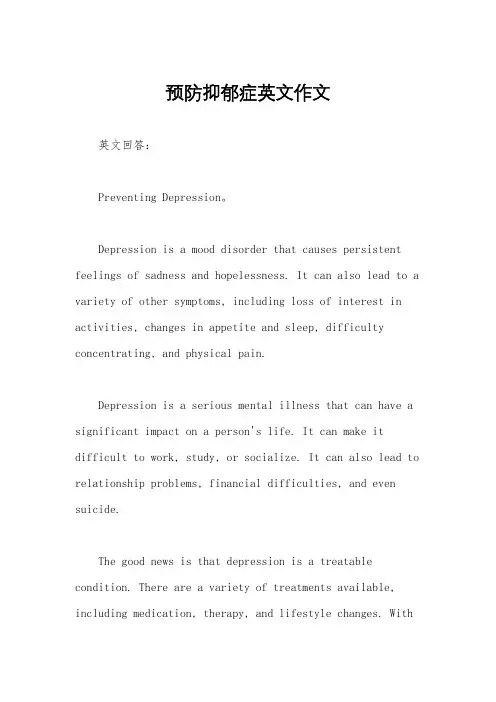
预防抑郁症英文作文英文回答:Preventing Depression。
Depression is a mood disorder that causes persistent feelings of sadness and hopelessness. It can also lead to a variety of other symptoms, including loss of interest in activities, changes in appetite and sleep, difficulty concentrating, and physical pain.Depression is a serious mental illness that can have a significant impact on a person's life. It can make it difficult to work, study, or socialize. It can also lead to relationship problems, financial difficulties, and even suicide.The good news is that depression is a treatable condition. There are a variety of treatments available, including medication, therapy, and lifestyle changes. Withthe right treatment, most people with depression can recover and live full and productive lives.There are a number of things you can do to help prevent depression, including:Exercise regularly. Exercise has been shown to improve mood and reduce symptoms of depression. Aim for at least 30 minutes of moderate-intensity exercise most days of the week.Eat a healthy diet. Eating a healthy diet can help improve your overall health and well-being. Make sure to eat plenty of fruits, vegetables, and whole grains. Limit your intake of processed foods, sugary drinks, and unhealthy fats.Get enough sleep. Most adults need 7-8 hours of sleep per night. When you don't get enough sleep, it can worsen your mood and increase your risk of depression.Manage stress. Stress can trigger depression in somepeople. Find healthy ways to manage stress, such as exercise, yoga, meditation, or spending time in nature.Connect with others. Having strong social connections can help protect against depression. Make time for friends and family, and get involved in activities that you enjoy.Avoid alcohol and drugs. Alcohol and drugs can worsen depression symptoms. If you are struggling with depression, it is important to avoid using these substances.Talk to a doctor if you are feeling depressed. If you are experiencing symptoms of depression, it is important to talk to a doctor. Depression is a treatable condition, and with the right treatment, you can recover and live a full and productive life.中文回答:预防抑郁症。

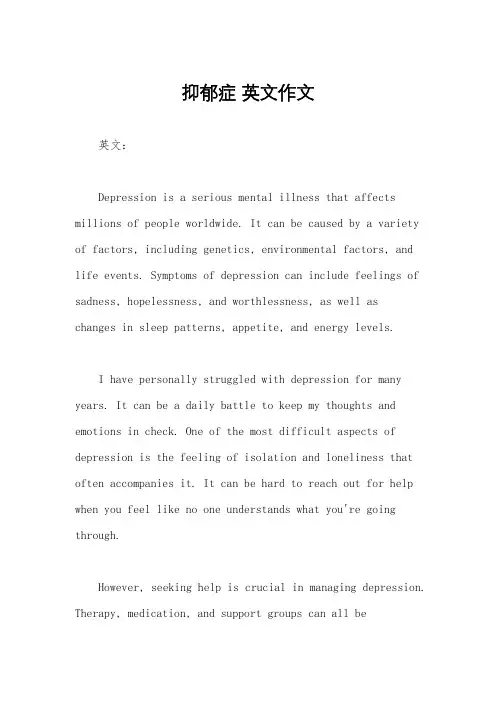
抑郁症英文作文英文:Depression is a serious mental illness that affects millions of people worldwide. It can be caused by a variety of factors, including genetics, environmental factors, and life events. Symptoms of depression can include feelings of sadness, hopelessness, and worthlessness, as well as changes in sleep patterns, appetite, and energy levels.I have personally struggled with depression for many years. It can be a daily battle to keep my thoughts and emotions in check. One of the most difficult aspects of depression is the feeling of isolation and loneliness that often accompanies it. It can be hard to reach out for help when you feel like no one understands what you're going through.However, seeking help is crucial in managing depression. Therapy, medication, and support groups can all beeffective in treating depression. It's important to find a treatment plan that works for you and to be patient with yourself as you work towards recovery.中文:抑郁症是一种严重的精神疾病,影响着全球数百万人。
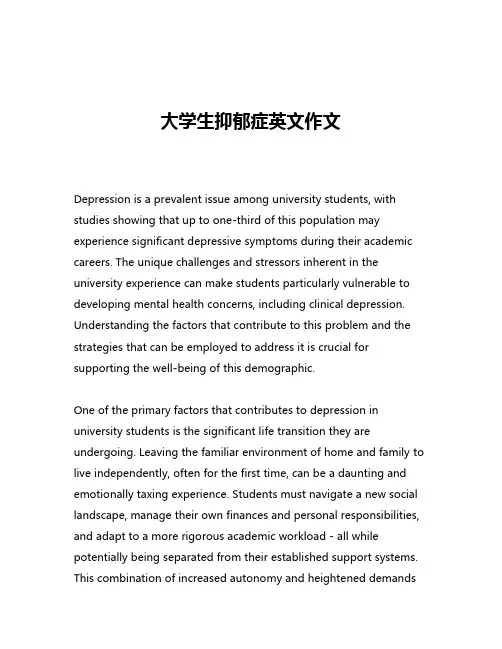
大学生抑郁症英文作文Depression is a prevalent issue among university students, with studies showing that up to one-third of this population may experience significant depressive symptoms during their academic careers. The unique challenges and stressors inherent in the university experience can make students particularly vulnerable to developing mental health concerns, including clinical depression. Understanding the factors that contribute to this problem and the strategies that can be employed to address it is crucial for supporting the well-being of this demographic.One of the primary factors that contributes to depression in university students is the significant life transition they are undergoing. Leaving the familiar environment of home and family to live independently, often for the first time, can be a daunting and emotionally taxing experience. Students must navigate a new social landscape, manage their own finances and personal responsibilities, and adapt to a more rigorous academic workload - all while potentially being separated from their established support systems. This combination of increased autonomy and heightened demandscan be overwhelming, leading to feelings of isolation, anxiety, and a diminished sense of control.Moreover, the academic pressures inherent in the university setting can be a major contributor to depression among students. The pressure to excel academically, maintain high grades, and secure internships or post-graduation employment can place a significant burden on students' mental and emotional resources. The fear of failure, coupled with the intense competition fostered in many academic environments, can exacerbate feelings of inadequacy, self-doubt, and low self-esteem - all of which are hallmark symptoms of depression.In addition to the academic and transitional challenges, many university students also face concerns related to their physical health and well-being. The transition to university life can disrupt established routines and healthy habits, leading to irregular sleep patterns, poor nutrition, and decreased physical activity. These lifestyle changes can have a direct impact on an individual's mental health, as physical well-being is closely linked to emotional and psychological functioning.Furthermore, the university environment can also expose students to additional risk factors for depression, such as substance abuse, relationship difficulties, and financial stressors. The availability ofalcohol and drugs on many campuses, coupled with the social pressures to engage in these behaviors, can lead to problematic patterns of use that exacerbate depressive symptoms. Similarly, the challenges of navigating new romantic relationships or the dissolution of existing ones can be a significant source of distress for university students, further contributing to the development of depression.It is important to recognize that the manifestation of depression in university students may differ from the typical presentation in other populations. While the core symptoms of persistent low mood, loss of interest, and changes in appetite and sleep patterns may be present, university students may also exhibit unique behaviors, such as increased procrastination, difficulty concentrating on academic tasks, and a decline in academic performance. These symptoms can further compound the existing challenges faced by students, creating a vicious cycle that perpetuates the depressive episode.Fortunately, there are a number of strategies and interventions that can be employed to address depression among university students. One of the most important steps is to destigmatize mental health concerns and encourage open dialogue about the challenges students are facing. By fostering a campus culture that normalizes the experience of mental health struggles and promotes help-seeking behavior, universities can empower students to be proactivein addressing their emotional well-being.Additionally, universities should strive to provide comprehensive mental health services and resources on campus, including counseling centers, support groups, and accessible mental health education programs. These services can offer students the opportunity to address their depression through evidence-based treatments, such as cognitive-behavioral therapy and pharmacological interventions, while also providing practical coping strategies and skills for managing stress and maintaining overall well-being.Beyond the institutional level, it is also crucial for university students to develop personal strategies for self-care and resilience-building. This may include engaging in regular physical exercise, practicing mindfulness or meditation, maintaining a balanced sleep schedule, and cultivating a strong social support network. By prioritizing their overall health and well-being, students can better equipped to navigate the challenges of university life and mitigate the risk of developing depression.It is important to note that addressing depression among university students requires a multifaceted approach, involving the collaboration of administrators, mental health professionals, faculty, and the students themselves. By acknowledging the uniquechallenges faced by this population and implementing comprehensive, evidence-based strategies, universities can play a vital role in supporting the mental health and overall well-being of their students, ultimately fostering an environment that enables academic and personal success.In conclusion, depression is a significant concern among university students, with the unique stressors and transitions of the university experience contributing to the development of this mental health issue. By understanding the factors that contribute to depression in this population and implementing effective interventions, universities can play a crucial role in supporting the emotional well-being of their students and promoting a healthy, thriving academic community.。
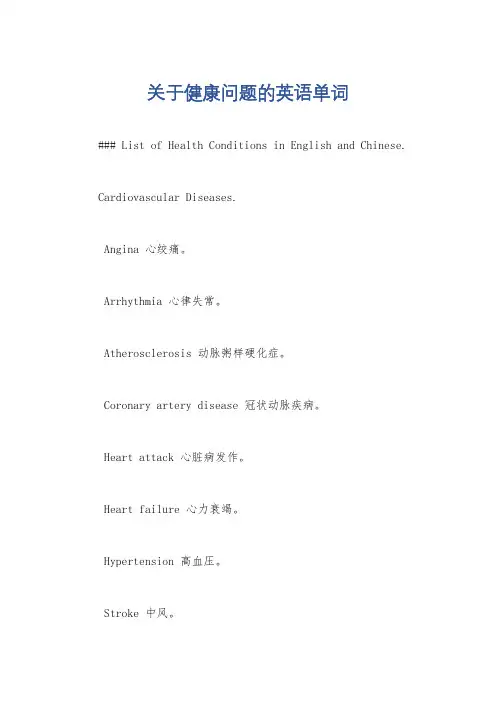
关于健康问题的英语单词### List of Health Conditions in English and Chinese. Cardiovascular Diseases.Angina 心绞痛。
Arrhythmia 心律失常。
Atherosclerosis 动脉粥样硬化症。
Coronary artery disease 冠状动脉疾病。
Heart attack 心脏病发作。
Heart failure 心力衰竭。
Hypertension 高血压。
Stroke 中风。
Respiratory Diseases.Asthma 哮喘。
Bronchitis 支气管炎。
Chronic obstructive pulmonary disease (COPD) 慢性阻塞性肺疾病。
Emphysema 肺气肿。
Influenza 流感。
Lung cancer 肺癌。
Pneumonia 肺炎。
Tuberculosis 结核病。
Gastrointestinal Diseases.Cirrhosis 肝硬化。
Colitis 结肠炎。
Constipation 便秘。
Crohn's disease 克罗恩病。
Diarrhea 腹泻。
Gallstones 胆结石。
Gastroesophageal reflux disease (GERD) 胃食管反流病。
Hemorrhoids 痔疮。
Hepatitis 肝炎。
Irritable bowel syndrome (IBS) 肠易激综合征。
Peptic ulcer disease 消化性溃疡病。
Neurological Diseases.Alzheimer's disease 阿尔茨海默病。
Amyotrophic lateral sclerosis (ALS) 肌萎缩侧索硬化症。
Brain cancer 脑癌。
Cerebral palsy 脑瘫。
Dementia 痴呆。
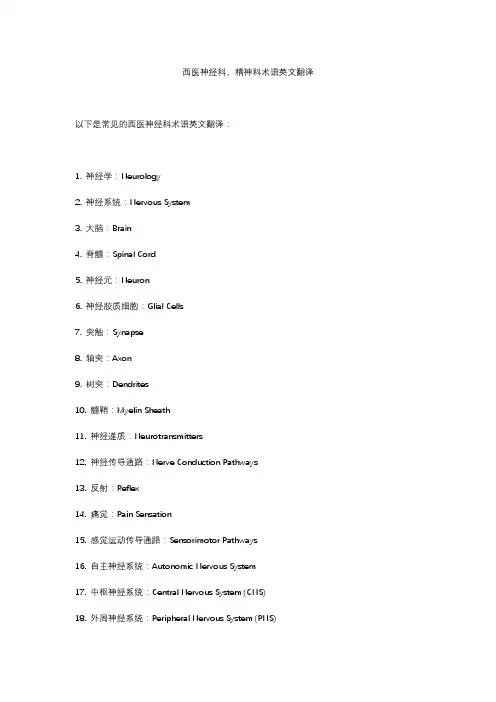
西医神经科、精神科术语英文翻译以下是常见的西医神经科术语英文翻译:1. 神经学:Neurology2. 神经系统:Nervous System3. 大脑:Brain4. 脊髓:Spinal Cord5. 神经元:Neuron6. 神经胶质细胞:Glial Cells7. 突触:Synapse8. 轴突:Axon9. 树突:Dendrites10. 髓鞘:Myelin Sheath11. 神经递质:Neurotransmitters12. 神经传导通路:Nerve Conduction Pathways13. 反射:Reflex14. 痛觉:Pain Sensation15. 感觉运动传导通路:Sensorimotor Pathways16. 自主神经系统:Autonomic Nervous System17. 中枢神经系统:Central Nervous System (CNS)18. 外周神经系统:Peripheral Nervous System (PNS)19. 神经肌肉接头:Neuromuscular Junction20. 癫痫:Epilepsy21. 帕金森病:Parkinson's Disease22. 多发性硬化症:Multiple Sclerosis (MS)23. 脑卒中:Stroke24. 脑外伤:Traumatic Brain Injury (TBI)25. 脑瘤:Brain Tumors26. 脑炎:Brain Infections / Encephalitis27. 神经痛:Neuralgia28. 头痛:Headache29. 失眠:Insomnia30. 肌肉萎缩:Muscle Atrophy31. 肌无力:Muscle Weakness32. 神经根病:Radiculopathy33. 神经丛病变:Plexopathy34. 脊髓病变:Myelopathy35. 脑积水:Hydrocephalus36. 脊髓空洞症:Syringomyelia37. 脑电图(EEG):Electroencephalogram (EEG)38. 肌电图(EMG):Electromyogram (EMG)39. 经颅磁刺激(TMS):Transcranial Magnetic Stimulation (TMS)40. 正电子发射断层扫描(PET):Positron Emission Tomography (PET)41. 功能磁共振成像(fMRI):Functional Magnetic Resonance Imaging (fMRI)42. 单光子发射计算机断层扫描(SPECT):Single Photon Emission Computed Tomography (SPECT)43. 经颅多普勒超声(TCD):Transcranial Doppler Ultrasound (TCD)44. 认知障碍:Cognitive Dysfunction45. 情绪障碍:Mood Disorders46. 神经退行性疾病:Neurodegenerative Diseases47. 中毒性脑病:Toxic Encephalopathy48. 脑死亡:Brain Death49. 昏迷:Coma50. 意识障碍:Disorders of Consciousness西医精神科术语英文翻译以下是常见的西医精神科术语英文翻译:1. 焦虑症:Anxiety Disorders2. 抑郁症:Depression3. 精神分裂症:Schizophrenia4. 双相情感障碍:Bipolar Disorder5. 创伤后应激障碍:Post-Traumatic Stress Disorder (PTSD)6. 强迫症:Obsessive-Compulsive Disorder (OCD)7. 失眠症:Insomnia8. 嗜睡症:Hypersomnia9. 睡眠障碍:Sleep Disorders10. 神经衰弱:Neurasthenia11. 精神发育迟滞:Mental Retardation12. 自闭症谱系障碍:Autism Spectrum Disorders (ASD)13. 注意缺陷多动障碍:Attention Deficit Hyperactivity Disorder (ADHD)14. 抽动症:Tic Disorders15. 创伤性脑损伤:Traumatic Brain Injury (TBI)16. 进食障碍:Eating Disorders17. 物质滥用:Substance Abuse18. 心理治疗:Psychotherapy19. 药物治疗:Pharmacotherapy20. 电休克疗法:Electroconvulsive Therapy (ECT)21. 支持性心理治疗:Supportive Psychotherapy22. 暴露疗法:Exposure Therapy23. 认知行为疗法:Cognitive Behavioral Therapy (CBT)24. 人际关系疗法:Interpersonal Therapy (IPT)25. 心理疏导:Psychological Counseling26. 精神科会诊:Psychiatric Consultation27. 心理评估:Psychological Evaluation28. 心理测验:Psychological Testing29. 精神卫生机构:Mental Health Facilities30. 心理健康促进活动:Mental Health Promotion Activities31. 精神疾病预防:Mental Illness Prevention32. 心理健康干预措施:Mental Health Intervention Measures33. 心理疏导热线:Psychological Counseling Hotline34. 心理健康服务:Mental Health Services35. 精神卫生保健工作者:Mental Health Care Workers36. 心理疾病患者支持团体:Support Groups for People with Mental Illnesses37. 精神卫生法:Mental Health Law38. 心理健康政策:Mental Health Policies39. 精神卫生运动:Mental Health Initiatives40. 心境障碍:Mood Disorders (MDs)。
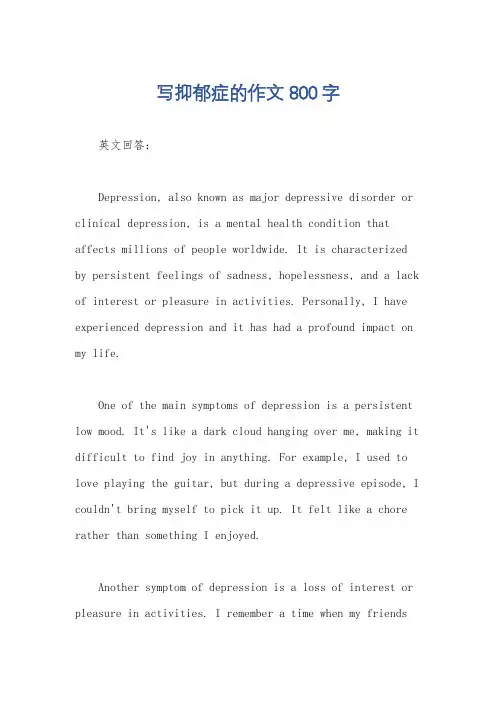
写抑郁症的作文800字英文回答:Depression, also known as major depressive disorder or clinical depression, is a mental health condition that affects millions of people worldwide. It is characterized by persistent feelings of sadness, hopelessness, and a lack of interest or pleasure in activities. Personally, I have experienced depression and it has had a profound impact on my life.One of the main symptoms of depression is a persistent low mood. It's like a dark cloud hanging over me, making it difficult to find joy in anything. For example, I used to love playing the guitar, but during a depressive episode, I couldn't bring myself to pick it up. It felt like a chore rather than something I enjoyed.Another symptom of depression is a loss of interest or pleasure in activities. I remember a time when my friendsinvited me to go hiking, something I used to love. However, I just couldn't muster up the energy or motivation to go.It felt overwhelming and pointless.Depression also affects my sleep patterns. I often struggle with insomnia, finding it difficult to fall asleep or stay asleep throughout the night. This lack of sleep further exacerbates my depressive symptoms, making it even harder to function during the day.Furthermore, depression can also lead to physical symptoms. For me, it manifests as a constant feeling of fatigue and low energy. It's like carrying around a heavy weight all the time, making even the simplest tasks feel exhausting.中文回答:抑郁症,也被称为重度抑郁障碍或临床抑郁症,是一种影响全球数百万人的心理健康疾病。
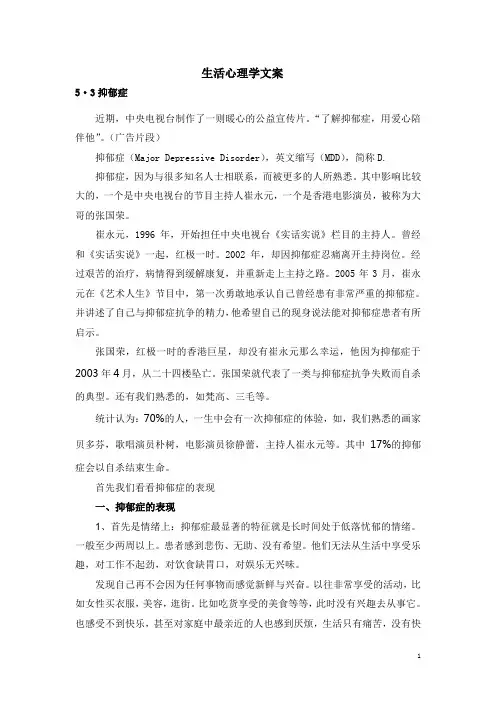
生活心理学文案5·3抑郁症近期,中央电视台制作了一则暖心的公益宣传片。
“了解抑郁症,用爱心陪伴他”。
(广告片段)抑郁症(Major Depressive Disorder),英文缩写(MDD),简称D.抑郁症,因为与很多知名人士相联系,而被更多的人所熟悉。
其中影响比较大的,一个是中央电视台的节目主持人崔永元,一个是香港电影演员,被称为大哥的张国荣。
崔永元,1996年,开始担任中央电视台《实话实说》栏目的主持人。
曾经和《实话实说》一起,红极一时。
2002年,却因抑郁症忍痛离开主持岗位。
经过艰苦的治疗,病情得到缓解康复,并重新走上主持之路。
2005年3月,崔永元在《艺术人生》节目中,第一次勇敢地承认自己曾经患有非常严重的抑郁症。
并讲述了自己与抑郁症抗争的精力,他希望自己的现身说法能对抑郁症患者有所启示。
张国荣,红极一时的香港巨星,却没有崔永元那么幸运,他因为抑郁症于2003年4月,从二十四楼坠亡。
张国荣就代表了一类与抑郁症抗争失败而自杀的典型。
还有我们熟悉的,如梵高、三毛等。
统计认为:70%的人,一生中会有一次抑郁症的体验,如,我们熟悉的画家贝多芬,歌唱演员朴树,电影演员徐静蕾,主持人崔永元等。
其中17%的抑郁症会以自杀结束生命。
首先我们看看抑郁症的表现一、抑郁症的表现1、首先是情绪上:抑郁症最显著的特征就是长时间处于低落忧郁的情绪。
一般至少两周以上。
患者感到悲伤、无助、没有希望。
他们无法从生活中享受乐趣,对工作不起劲,对饮食缺胃口,对娱乐无兴味。
发现自己再不会因为任何事物而感觉新鲜与兴奋。
以往非常享受的活动,比如女性买衣服,美容,逛街。
比如吃货享受的美食等等,此时没有兴趣去从事它。
也感受不到快乐,甚至对家庭中最亲近的人也感到厌烦,生活只有痛苦,没有快乐。
也可能常常独自哭泣。
有时忧郁症的患者表现的可能不是抑郁,可能是情绪激动,非常容易发火。
对生活的容忍度非常差,情绪非常脆弱,2、第二是认识方面。

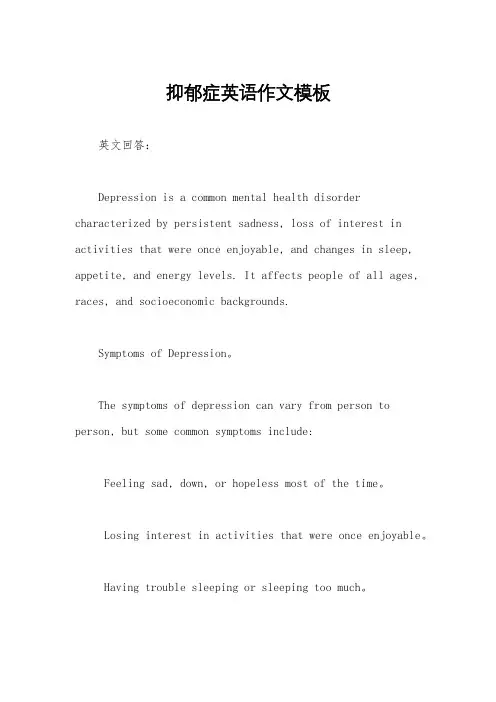
抑郁症英语作文模板英文回答:Depression is a common mental health disorder characterized by persistent sadness, loss of interest in activities that were once enjoyable, and changes in sleep, appetite, and energy levels. It affects people of all ages, races, and socioeconomic backgrounds.Symptoms of Depression。
The symptoms of depression can vary from person to person, but some common symptoms include:Feeling sad, down, or hopeless most of the time。
Losing interest in activities that were once enjoyable。
Having trouble sleeping or sleeping too much。
Having trouble concentrating or making decisions。
Feeling tired or having low energy。
Having changes in appetite or weight。
Having physical symptoms, such as aches and pains, headaches, or digestive problems。
Feeling worthless or guilty。
Having thoughts of self-harm or suicide。
Causes of Depression。
抑郁症的英文作文英文:Depression is a serious mental illness that affects millions of people worldwide. It is characterized by persistent feelings of sadness, hopelessness, and a loss of interest in activities that were once enjoyed. As someone who has struggled with depression, I can attest to the fact that it can be a debilitating condition that affects every aspect of one's life.One of the most difficult things about depression is that it can be hard to explain to others who haven't experienced it themselves. People may tell you to "just snap out of it" or "think positive," but it's not that simple. Depression is a complex illness that often requires professional help to overcome.One of the things that has helped me in my own journey with depression is therapy. Talking to a trained therapistcan help you understand the root causes of your depression and develop coping mechanisms to manage your symptoms. Medication can also be helpful for some people, but it's important to work with a doctor to find the right treatment plan for you.It's also important to take care of yourself physically. Eating a healthy diet, getting enough sleep, and exercising regularly can all help improve your mood and reduce symptoms of depression. Finding ways to relax and manage stress, such as through meditation or yoga, can also be beneficial.Ultimately, it's important to remember that depressionis a treatable illness. It may take time and effort, butwith the right support and treatment, it is possible to overcome.中文:抑郁症是一种严重的心理疾病,影响着全球数百万人。
What is depression?什么是抑郁症?This topic covers depression in adults.For information on depression in young people,see the topic Depression in Childhood and Adolescence1.For information on depression following childbirth,see the topic Postpartum Depression.本文探讨的主要关于成年人的抑郁症。
若需查询关于末成人的抑郁症,请查看“儿童和青年人的抑郁症。
产后抑郁症请查看”产后抑郁“。
Depression is a mood disorder2 that causes you to feel sad or hopeless for an extended period of time.More than just a bout3 of the blues4 or temporary feelings of grief or low energy,depression can have a significant impact on your enjoyment5 of life,your work,your health,and the people you care about.抑郁是在一段时间内持续的一种精神絮乱,它让人感觉悲伤,对生活失去希望。
不止发作一次的悲伤心情,或没有精力,抑郁对人们的生活,工作,健康,甚至对周围的人们都会产生很大的影响。
Depression affects people differently.Some feel down for extended periods of time;for others the feelings of depression come and go.If you have short episodes of mild depression,you may be able to continue to work and take care of daily activities.However,if you do not seek some form of treatment for your depression,you are at risk for getting more depressed6 or becoming physically7 ill.In severe cases,depression can cause people to become incapable8 of communicating,unable to do routine activities,or suicidal.In these cases,it is essential to seek medical attention.抑郁对人们的影响是不同的。
关于抑郁症看法英文作文Depression is a serious mental health condition thatcan affect anyone, regardless of age, gender, or background. It is not simply feeling sad or down, but rather apersistent feeling of hopelessness and despair that can interfere with daily life.People with depression may experience a range of symptoms, including low energy, changes in appetite orsleep patterns, and difficulty concentrating. It can also lead to feelings of worthlessness and thoughts of self-harm or suicide.It is important to recognize that depression is not a sign of weakness or a character flaw. It is a medical condition that requires treatment, such as therapy, medication, or a combination of both. Seeking help from a mental health professional is essential for managing depression and improving overall well-being.It is also important for friends and family members to offer support and understanding to those struggling with depression. Listening without judgment, offering encouragement, and helping to connect them with professional help can make a difference in their recovery.Depression can be a long-term condition, but with the right treatment and support, it is possible to manage symptoms and lead a fulfilling life. It is important to remember that recovery is possible and that no one has to face depression alone.。
2.1.1 the symptoms of slight and major depression
Depression is a medical condition in which a person feels very sad and anxious and often has physical symptoms.Slight depression could be a portion of major depression, so the criteria for this disease are important to consider and examine for people with the problem. If the depression is only minor, it will not have all of the components of major depression and therefore would be treated differently from the more serious version of the disease.The most common diagnostic criteria are encapsulated in the mnemonic device SIGECAPS. They are in the order of the letters, Sleep problems, lack of Interest, Guilty feelings, lack of Energy, problems with Concentration, Appetite and weight disturbances, Psychomotor retardation, and Suicidal thoughts or actions. If a person has five or six items in this criteria it is very likely that they have major depression and they should be treated for it. If they only have one or two of them they might have a less serious version of the disease, but it still may require treatment. The only difference is that it could be more minor. By asking about these different symptoms, people perform a basic diagnosis test to evaluate themselves or their patients.
The symptoms of serious to slight depression may be very debilitating to a patient and identification of the problem is the first step to a full recovery. The condition of depressive disorders is prevalent through all walks of life and it is expected that the majority of persons will experience symptoms of depression at least once in the course of their life. However, since most people experience these symptoms at some point, extended research has been done to determine the best way to treat these specific conditions and many solutions are available to sufferers.
2.1.2 cause of depression
Irregular diet habits cause digestive problems and lead to the assimilation
of fats. An excess of carbohydrates like cereals, white sugar, Coffee, tea,
chocolates and comparatively less quantities of vegetables and fruits in
the diet may result in indigestion. Due to indigestion, gases are produced
in the digestive tract, causing compression over the diaphragm in the
region of the heart and lungs. This in turn, reduces the supply of oxygen to the tissues, which raises the carbon dioxide level, causing general Depression.。